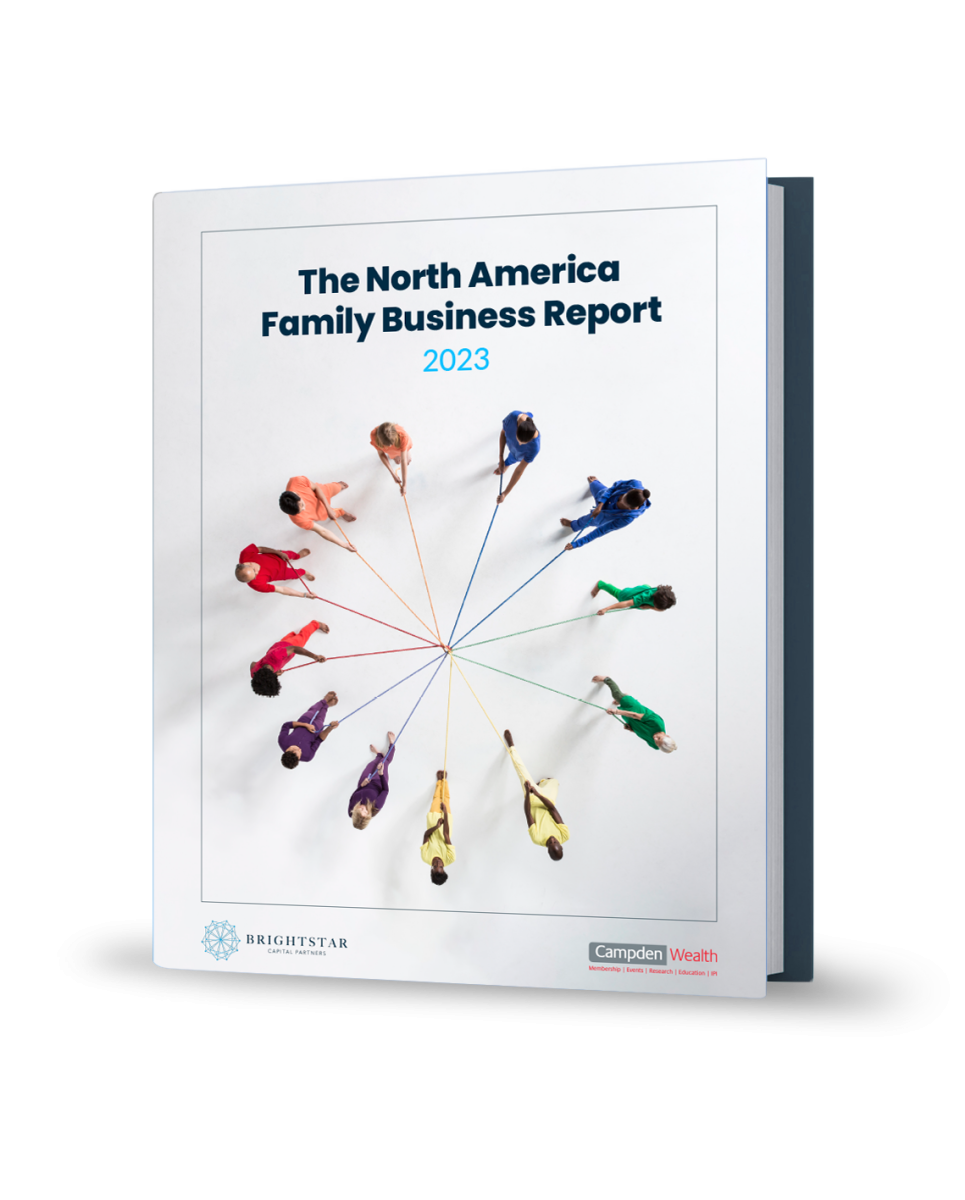Why communication issues and lack of succession planning are putting North American family businesses at risk

For many well-established North American family businesses, long-term planning and forward thinking are the hallmarks of their enduring success. However, findings in The North America Family Business Report 2023 from Brightstar Capital Partners and Campden Wealth reveal that a majority of family businesses should address formal succession planning amid fears about a market downturn fueled by higher inflation and rising interest rates.
The report, which surveyed more than 100 family businesses with an average annual revenue of more than $340 million, found that succession planning, family conflict and the current global economic environment are among the major concerns for owners and executives.
Keeping up with the global trend, North American family enterprises are undergoing a major succession wave, but few are prepared. A majority of family businesses surveyed (61%) do not have a written, formal succession plan in place, emphasising the lack of preparedness when handing over control to the next generation. Forty-four percent still need to develop a succession plan or have no plan at all, while 16% rely on informal plans. Among the most common challenges related to succession are discomfort in discussing sensitive topics (29%) and the lack of willing / sufficiently qualified Next Gens to take over the reins (22%). Another 21% believe the family has not invested enough time into succession planning.
“Family dynamics are often challenging, whether running a business or sitting down during Thanksgiving dinner,” says Roger Bulloch, partner at Brightstar Capital Partners. “However, given the importance of succession planning in ensuring the long-term success of a family business, it is concerning that so many businesses do not have a plan in place.”

“Working with family can be a balancing act,” says Dr Anne Henow, Campden Wealth’s associate director of research. “The study shows that family members often feel uncomfortable discussing sensitive issues (according to 29% of respondents). In contrast, others believe that the family needs to invest more time into succession planning (21%). From our interviews with family business owners, we know that even the closest families find it challenging to address formal questions around succession planning.”
To mitigate these communication issues, the vast majority of respondents (80%) recommend establishing regular communication channels between family members to help them resolve business-related conflicts. Dr Henow explains: “Professional advisers are a vital resource when trying to create an inclusive family governance structure, but our findings show that only 23% of those surveyed rely on external support when they experience family conflict.
Despite the challenges posed by the global pandemic, geopolitical tensions, and a potential recession, family businesses are thriving.
“Family members may be hesitant to seek external support due to a desire to maintain family harmony,” says Tom Meredith, partner at Brightstar Capital Partners. “I think human nature leads some family members to think that going ‘outside the family’ violates the family trust. In my experience, families that overcome their fears reap the rewards because the third party serves as the lightning rod during the dispute, saving family members’ relationships and ultimately benefiting the business.”
“The younger generations are very open to establishing functioning communication channels, so, overall, we are seeing a gradual shift towards more engagement of professionals and external support,” says Dr. Henow. “Still, in interviews with Next Gens, they often report resistance from the older generation when trying to address complicated family dynamics through an external professional.”

Despite these inter-generational differences on communication, enterprising families still appear united and work closely to ensure enduring success of their business. “Family businesses represented in the study have been operating for 60 years on average, much longer than a public company's expected lifespan,” says Dr. Henow. “Their resilience is strongly connected to long-term thinking, a family value system, and altruism toward the welfare of the family and the company.”
Questioning business owners and executives about their ownership structure, the report found that the vast majority of family businesses surveyed are fully owned by family members (75%) and 91% say they have no plans to sell stakes in the family business.
“This finding does signify that families are supremely confident in their ability to continue the growth of their businesses and legacies,” says Roger Bulloch. “But the overwhelming 91% figure also suggests a reluctance to consider alternative options for the business.”
Still, the remaining proportion of respondents should not be overlooked, says Dr. Henow. “A significant 9% are looking to sell stakes in the business as they are trying to adjust to the new economic environment.”
While family businesses across North America are a true engine for the economy, they are certainly not immune to macro conditions.
With financial fortunes subject to pressure from a host of external forces, family businesses surveyed believe growth will slow in the next 12 months. Having enjoyed a solid average revenue growth rate of 12% over the past year, respondents now expect a 3% decline, down to an average of 9%. Higher inflation and rising interest rates particularly concern 75% of respondents.
“While family businesses across North America are a true engine for the economy, they are certainly not immune to macro conditions,” says Michael Drexler, managing director at Brightstar Capital Partners. “They must deal with inflation, a high interest rate environment, the tight labour market and potential geopolitical shocks, all of which can potentially cause a slowdown.”
In this economic context, Next Gens are expected to take on greater responsibility in leading family businesses in the future. Motivated by the desire to protect and sustain the business (according to 81% of respondents) when joining the family enterprise, they are also looking to embrace digital transformation and increase the use of technology (according to 24% and 23% of respondents, respectively).
“Based on these findings, we can expect a push for new tech investments if these positively promote business interests,” says Dr. Henow. “The report also shows which technologies will likely shape operations in the future. Artificial intelligence, robotics and the internet of things are considered most impactful for the family business over the next five to ten years (according to 49%, 44%, and 43% of respondents, respectively). Keeping ahead of the curve when looking for innovative solutions, 32% also believe blockchain will transform 32% the businesses in the coming years.
Michael Drexler says: “Family businesses are far more innovative than they are given credit for, that is why they are so often able to survive and thrive through various economic cycles.”








